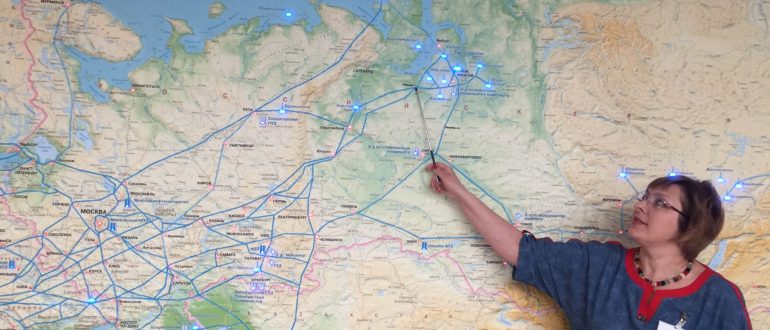
Novy Urengoy & Surgut: Part 5 of the Forgotten Places in Siberia Excursion
After our night trip to the former Gulag camps alongthe Salekhard-Igarka Railway, we had the chance to stop in Pangody. It’s a small town but home to one of very few memorials dedicated to the workers of the Stalin railway, otherwise called “Project 501”. Later we arrived in Novy Urengoy, which was founded in 1975 after one of the world’s largest gas fields was discovered in the region in the 1960s. The name comes from the words Уре (Ure), which in the language of the Khantys means “bed of the river” and Нго (Ngo), which means “island”. Together, it means ”the island in the river bed”. Initially a small village, workers soon started to settle after the discovery of gas.. The first train arrived in September 1982, which was a major driver of further development as it connected the far northern city with the rest of the country. Today, Novy Urengoy has a population of around 100.000 people and is the second largest city in the okrug. It is entirely dependent on gas extraction. The three Gazprom branches Urengoigazprom, Jamburggazdobytscha und Tjumenburgaz are the main employers and together, they make up for 75% of the country’s overall gas production.
With the help of our local guide, Yulia, and the father of a Russian participant, we were able to get a tour through the private Gazprom museum. As one might expect, this was a great show about the developments of Gazprom and their (positive) impact on society. The company does have a huge impact on the economic development of Russia but critical issues like the destruction of nature and the resettlement of people in order to extract gas from new areas were not addressed by the museum. Since of our Russian participants was born in Novy Urengoy, we also had the possibility to discover the city which is divided in two parts by the river Sedzyakha. Novy Urengoy is growing continuously but perspectives for the younger generation are dire if they want to learn a profession that is not connected to oil and gas Many teenagers leave to study or work in big cities such as Moscow, St. Petersburg or the closer Yekaterinburg. The growth factor of the city effectively has only one name — Gazprom. Interestingly, we also found a big memorial dedicated to the Great Patriotic War. The city did not even exist during the war period but holds a big monument with a wide selection of tanks and other war machinery. The memorial was built in 1985 in honour of the 40 year anniversary of the Soviet victory in the Second World War.
Speaking of Soviet — travelling back to Surgut, we departed from the modern, newly built Novy Urengoy train station in an old, Soviet train. During the journey, we had a first and last time encounterwith alcoholism in Russia and the fight against it. Recent studies showed that alcoholism is not as widespread in Russian society nowadays as in the past, especially towards the end of the Soviet Union. In our train, a completely drunk man wanted to show us his power and demanded that we only speak Russian. He did, however, not think of the police officers accompanying the train. His journey was over at the next station as he was forced to leave the train, holding a toy bobby car for his kids in one hand — a really sad view. Nevertheless, during the train ride we got to enjoy the Russian oil- and gas fields with a great sunset. In Surgut, we had a great final discussion and wrap-up session as well as a nice last evening with fantastic food and drinks.
But what is the conclusion of the trip? My personal conclusion is that this country needs time to come to terms with its history and that we should not use our standards to judge. We can support the country with our knowledge but only if we are asked.It is important to take in account that the collapse of the Soviet Union was only 25 years ago. Only then, the country started to (partly) open their archives, which allowed scientists to do some research on the “white spots” of the country’s history, as Gorbachev called it. This enabled a discussion about history with a wider public. However, the 1990’s were a wild and largely chaotic decade and it’s understandable that other issues were prevailing for the public. So, first attempts are made and even if there are some rollbacks, the country is on a good way I think. It might, however, be a long process, longer than we expect or hope. We met people who are fighting for the historical truth and others who are glorifying the past. This gave us a perfect insight into today’s divided Russian society. In my opinion, getting in touch with people, having discussions, an exchange of opinions and thus getting insight views is much more importantthan sitting at home and judging from a purely outsider, academic perspective. This is why this trip gave us all a lot of things to think about, including our view of the country.
Thanks to IFAIR and the Yugra-University of Khanty-Mansiysk for the organization, and to the German Ministry of Foreign Affairs for the financial support.
This article was published as part of IFAIR’s ‘Memory as a tool of change – Forgotten Places in Siberia’ Impact Group.
